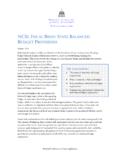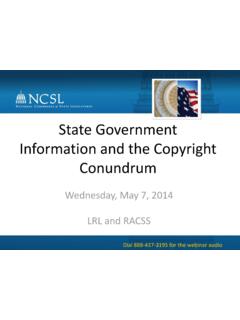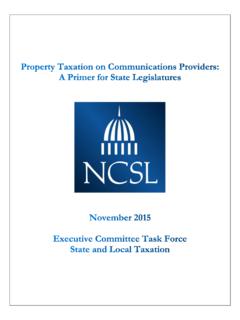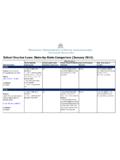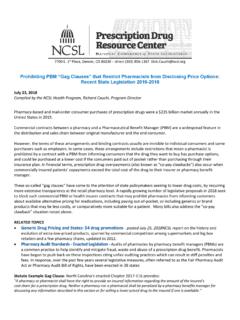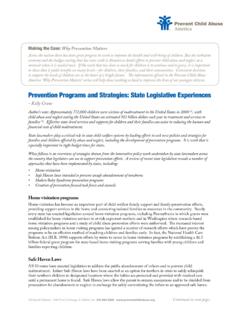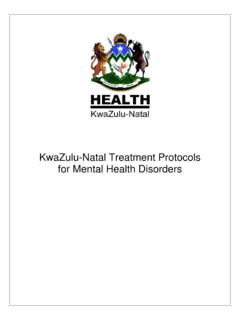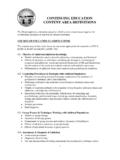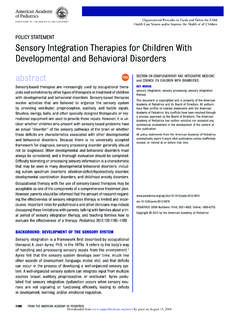Transcription of Mental Health Needs of Juvenile Offenders
1 Mental Health Needs of Juvenile OffendersMental Health Needs of Juvenile OffendersJuvenile Justice Guide Book for LegislatorsWithout treatment, the child may continue on a path of delinquency and eventually adult crime. Effective assessments of and comprehensive responses to court-involved juveniles with Mental Health Needs can help break this cycle and produce healthier young people who are less likely to act out and commit crimes. The importance of screening and treatment are also discussed in the Delinquency Prevention & Intervention chapter of this with Mental Health Needs sometimes enter a Juvenile justice system ill-equipped to assist them.
2 Between 65 percent and 70 percent of the 2 million children and adolescents arrested each year in the United States have a Mental Health disorder. Approximately one in four suffers from a Mental illness so severe it impairs his or her ability to function as a young person and grow into a responsible adult. 65 -70%Between 65 percent and 70 percent of the 2 million children and adolescents arrested each year in the United States have a Mental Health Health Needs of Juvenile OffendersAmerican children and teenagers sometimes experience conduct, mood, anxiety and substance abuse disorders. Often, they have more than one disorder; the most common co-occurrence is substance abuse with a Mental illness.
3 Frequently, these disorders put children at risk for troublesome behavior and delinquent acts. Behavioral disorders are characterized by actions that disturb or harm others and that cause distress or disability. Attention Deficit Hyperactivity Disorder (ADHD) and conduct disorders are typical youth behavioral disorders. According to the Center for Disease Control, an estimated 9 percent to 10 percent of approximately million American children suffer from ADHD, and percent of them take medication for their disorders occur when a child s ability to function is impaired by anxiety or depression.
4 The Center for Mental Health Services estimates that 1 in every 33 children and 1 in 8 adolescents are affected by depression, a potentially serious mood disorder that also afflicts many adults. The occurrence of depression among Juvenile Offenders is significantly higher than among other young Prevalent Among Youth in the General Population 3 Juvenile Justice Guide Book for LegislatorsScreening and assessment are vital to addressing Mental Health treatment Needs of youths in the Juvenile justice system. Screening and assessment are vital to addressing Mental Health treatment Needs of youths in the Juvenile justice system.
5 Screening attempts to identify the youths who warrant immediate Mental Health attention and further evaluation. Assessments are a more comprehensive and intensive examination of problems and behaviors exhibited by a young person. Proper assessments help those who determine risks, placement and treatment. Screening According to the National Center for Mental Health and Juvenile Justice, youths who immediately receive a Mental Health screening are more likely to have their problems identified and treated. In many jurisdictions, however, screening only occurs after a Juvenile has been adjudicated and placed in a correctional facility.
6 Efforts in Pennsylvania to improve the quality of services and care in Juvenile justice have included Youth in the Juvenile Justice System Many juveniles who commit delinquent acts have a history of substance abuse. In the Department of Justice s Arrestees Drug Abuse Monitoring Program, half the male juveniles arrested in nine separate sites tested positive for at least one drug. Studies also have shown that up to two-thirds of juveniles in the justice system with any Mental Health diagnosis had dual disorders, most often including substance abuse. In 2006, the National Mental Health Association reported that the prevalence of disruptive behavior disorders among youth in Juvenile justice systems is between 30 percent and 50 percent.
7 Anxiety disorders, post-traumatic stress disorder in particular, also are prevalent among Juvenile Offenders , especially girls. Psychotic disorders such as schizophrenia, however, are rare in the general population as well as in children involved in the justice system. Mental Health Assessment and TreatmentMental Health disorders are more complicated and difficult to treat in young people than in adults. Because adolescence is a unique developmental period characterized by growth and change, disorders in teens are more subject to change and interruption. Ongoing assessment and treatment, therefore, are important.
8 Mental Health Needs of Juvenile Offenders 4the use of screening protocols to identify young people with immediate Needs as well as those who require further assessments. All young people in Pennsylvania detention centers are screened using the Massachusetts Youth Screening Instrument, Version 2 (MAYSI-2). All young people in Pennsylvania detention centers are screened using the Massachusetts Youth Screening Instrument, Version 2 (MAYSI-2). Screening has resulted in a more effective response to youths with Mental Health Needs , including promoting awareness and competency among detention professionals in the state.
9 To encourage even more effective screening, Pennsylvania, in 2008, strengthened a Juvenile s right against self-incrimination by restricting the use of statements and other incriminating information obtained during Mental Health and substance abuse screenings. Illinois and Texas have passed similar legislation in recent has also recently passed a law requiring screening for Mental Health and substance abuse problems for juveniles who are taken into custody and held for detention hearings. The findings of these evaluations and subsequent treatment recommendations are required to be reported to the Juvenile court.
10 AssessmentSome states have approached Juvenile Mental Health issues from a different standpoint. Namely, they require evaluations of juveniles based on the seriousness or type of their offense. For example, in 2007, lawmakers in North Dakota and Oregon passed laws requiring alcohol and drug education, assessment and treatment for juveniles who commit alcohol-related offenses. Under a 2009 law in Tennessee, juveniles charged with offenses that would be felonies for adults must undergo court-ordered psychiatric evaluations. Under a 2009 law in Tennessee, juveniles charged with offenses that would be felonies for adults must undergo court-ordered psychiatric state must pay for the Mental Health evaluation unless it is determined that the Juvenile s parents can afford to reimburse the state.
